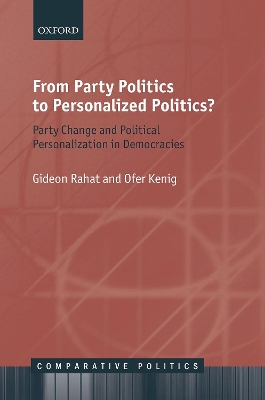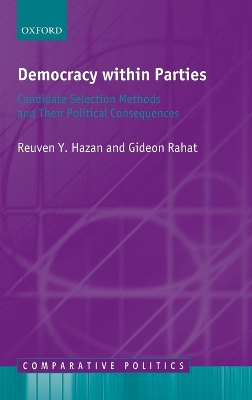Comparative Politics
2 total works
What do Beppe Grillo, Silvio Berlusconi, Emmanuel Macron (and also Donald Trump) have in common? They are prime examples of the personalization of politics and the decline of political parties.
This volume systematically examines these two prominent developments in contemporary democratic politics and the relationship between them. It presents a cross-national comparative comparison that covers around 50 years in 26 democracies through the use of more than 20 indicators. It offers the most comprehensive comparative cross-national estimation of the variance in the levels and patterns of party change and political personalization among countries to date, using existing works as well
injecting fresh cross-national comparative data. In the case of party change, it offers an analysis that extends beyond the dichotomous debate of party decline versus party adaptation. In the matter of political personalization, the emphasis on variance helps in bridging between the high theoretical
expectations and disappointing empirical findings. As for the theoretically sound linkage between the two phenomena, not only is this the first study to comprise a comprehensive cross-national examination, but it also proposes a more nuanced understanding of this relationship.
Comparative Politics is a series for researchers, teachers, and students of political science that deals with contemporary government and politics. Global in scope, books in the series are characterised by a stress on comparative analysis and strong methodological rigour. The series is published in association with the European Consortium for Political Research. For more information visit: www.ecprnet.eu.
The series is edited by Emilie van Haute, Professor of Political Science, Universite libre de Bruxelles; Ferdinand Muller-Rommel, Director of the Center for the Study of Democracy, Leuphana University; and Susan Scarrow, John and Rebecca Moores Professor of Political Science, University of Houston.
This volume systematically examines these two prominent developments in contemporary democratic politics and the relationship between them. It presents a cross-national comparative comparison that covers around 50 years in 26 democracies through the use of more than 20 indicators. It offers the most comprehensive comparative cross-national estimation of the variance in the levels and patterns of party change and political personalization among countries to date, using existing works as well
injecting fresh cross-national comparative data. In the case of party change, it offers an analysis that extends beyond the dichotomous debate of party decline versus party adaptation. In the matter of political personalization, the emphasis on variance helps in bridging between the high theoretical
expectations and disappointing empirical findings. As for the theoretically sound linkage between the two phenomena, not only is this the first study to comprise a comprehensive cross-national examination, but it also proposes a more nuanced understanding of this relationship.
Comparative Politics is a series for researchers, teachers, and students of political science that deals with contemporary government and politics. Global in scope, books in the series are characterised by a stress on comparative analysis and strong methodological rigour. The series is published in association with the European Consortium for Political Research. For more information visit: www.ecprnet.eu.
The series is edited by Emilie van Haute, Professor of Political Science, Universite libre de Bruxelles; Ferdinand Muller-Rommel, Director of the Center for the Study of Democracy, Leuphana University; and Susan Scarrow, John and Rebecca Moores Professor of Political Science, University of Houston.
Can too much participation harm democracy? Democratic theory places great importance upon the conduct of elections, but it is not often recognized that the electoral game takes place in two arenas, not only between parties but also within them. This pioneering book presents a new approach to understanding political parties. It sheds light on the inner dynamics of party politics and offers the first comprehensive analysis of one of the most important processes any
party undertakes - its process of candidate selection. Candidate selection methods are the mechanisms by which a party chooses its candidates for the general elections. It may be the function that separates parties from other organizations. For such an important function, this field has certainly faced
a dearth of serious investigation.
Hazan and Rahat, the leading scholars on this topic, conduct an in-depth analysis of the consequences of different candidate selection methods on democracy. This book is a culmination of almost two decades of research and defines the field of candidate selection. Part I of the book delineates candidate selection methods based on four major dimensions: candidacy; the selectorate; decentralization; and voting versus appointment systems. Part II analyses the political consequences of using
different candidate selection methods according to four important aspects of democracy: participation; representation; competition; and responsiveness. The book ends with a proposed candidate selection method that optimally balances all four of the democratic aspects concurrently, and answers the question
'Is the most participatory candidate selection method necessarily the best one for democracy?'
Comparative Politics is a series for students, teachers, and researchers of political science that deals with contemporary government and politics. Global in scope, books in the series are characterised by a stress on comparative analysis and strong methodological rigour. The series is published in association with the European Consortium for Political Research. For more information visit www.essex.ac.uk/ecpr
The General Editor is Professor David M. Farrell, School of Politics and International Relations, University College Dublin.
party undertakes - its process of candidate selection. Candidate selection methods are the mechanisms by which a party chooses its candidates for the general elections. It may be the function that separates parties from other organizations. For such an important function, this field has certainly faced
a dearth of serious investigation.
Hazan and Rahat, the leading scholars on this topic, conduct an in-depth analysis of the consequences of different candidate selection methods on democracy. This book is a culmination of almost two decades of research and defines the field of candidate selection. Part I of the book delineates candidate selection methods based on four major dimensions: candidacy; the selectorate; decentralization; and voting versus appointment systems. Part II analyses the political consequences of using
different candidate selection methods according to four important aspects of democracy: participation; representation; competition; and responsiveness. The book ends with a proposed candidate selection method that optimally balances all four of the democratic aspects concurrently, and answers the question
'Is the most participatory candidate selection method necessarily the best one for democracy?'
Comparative Politics is a series for students, teachers, and researchers of political science that deals with contemporary government and politics. Global in scope, books in the series are characterised by a stress on comparative analysis and strong methodological rigour. The series is published in association with the European Consortium for Political Research. For more information visit www.essex.ac.uk/ecpr
The General Editor is Professor David M. Farrell, School of Politics and International Relations, University College Dublin.

